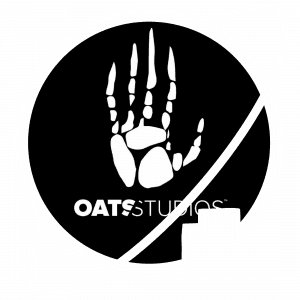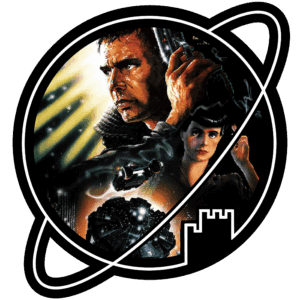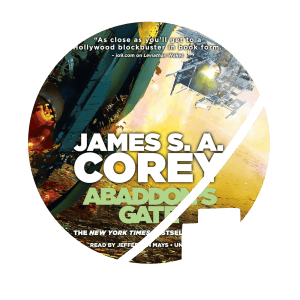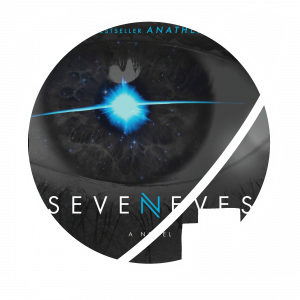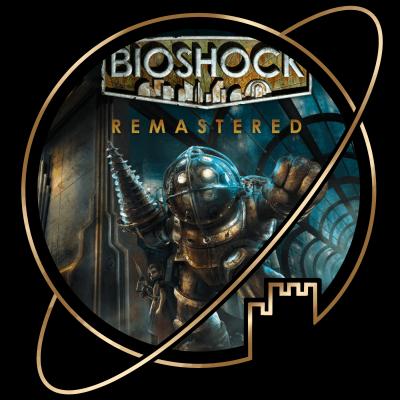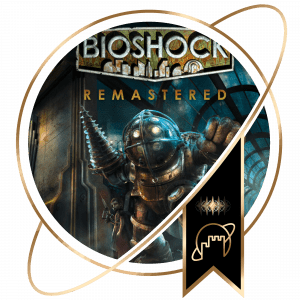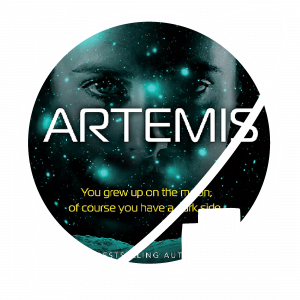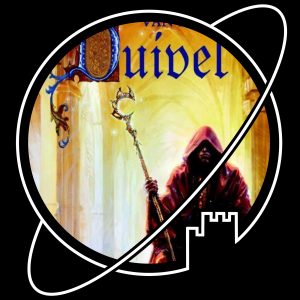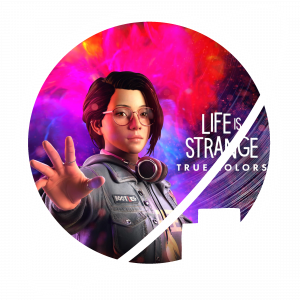Welcome to the Escape Velocity Collection!
We are an opinionated group of friends reviewing all sorts of fantasy and science fiction media. Don’t forget to get to know the curators and visit our curated Collection, where we discuss the stories that never cease to transport us to another world.
Will you escape with us?
LATEST POSTS:
- Audio drama written by Joseph Fink & Jeffrey Cranor
- Produced by NIght Vale Presents
- Published in 2012-present
- Starring Cecil Baldwin and others
Twice-monthly radio host Cecil gives community updates for the small desert town of Night Vale, the place ‘where every conspiracy theory is true’. It is an anthology comedic horror series (the kind that has monsters and paranormal activity, but is not scary). Each episode has the same format: the radio host welcomes his listeners with a troubling intro and then reports on a strange event (the main part), interspersed with recurring radio segments like traffic or the children’s fun fact science corner (side dishes). When the story is at its peak, it is time for ‘the weather’ (a music number), after which the issue is resolved and Cecil tells how they narrowly escaped whatever was happening. Good night, Night Vale. Good night.
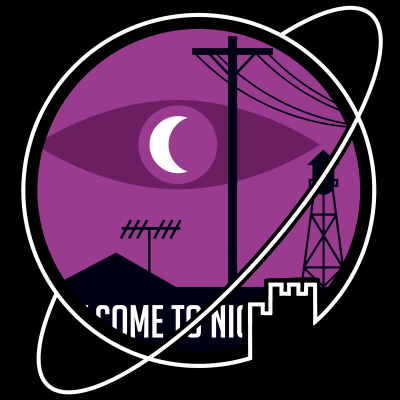

As I think for many people, Welcome to Night Vale is the podcast that brought me into podcasts. In fact, it was Lotte who recommended it to me, repeatedly. Until finally I listened to the pilot episode on YouTube (first time podcast listener right there). After 5 minutes, I was sold. The way this podcast makes the absurd and the unsettling mundane is wonderful. I’ll give one example from the pilot (paraphrased):
‘The city council announces the opening of a new dog park. They would like to remind everyone that dogs are not allowed in the dog park. People are not allowed in the dog park. It is possible you will see hooded figures in the dog park. Do NOT approach them. Do NOT approach the dog park. Do not look at the dog park, and especially do not look for any period of time at the hooded figures. The dog park will not harm you.’
I stepped in, I think, during the second year of this show, maybe even a little bit earlier. Since then, I have dutifully listened to every episode. I went to two live shows and follow/have followed much of the other work of creators Joseph Fink and Jeffrey Cranor. I think you might call me a fan.
Yet, the charm of Welcome to Night Vale has worn off a little bit for me. I do still ‘like’ the episodes, but I rarely ‘love’ them. I find myself melancholically looking back at the first seasons, when the world felt fresh, the humor unexpected and the characters new and exciting and strange.
The podcast started with stand-alone episodes, but as the podcast grew, the world developed and an overarching story was woven through the episodes. I loved that! Unfortunately, at some point the creators chose to go to an anthology format. Although I understand the choice – I think it makes sense for the format, the popularity (it is easier to just start listening with the latest episode), and I can imagine it makes it easier for the creators to do other things while still making Night Vale ‘in between’ – but for me, the overarching story deepened the show considerably.
Nevertheless, every two weeks Night Vale keeps entertaining me with its strange stories and beautiful cast of characters. And as long as the episodes keep coming, I will listen.
Favourite episode: ‘A Story About You’.
Shout out to: John Peters (you know, the farmer?), the man that is not short and the man that is not tall, (doppelgänger) Dana, Hiram McDaniels the five-headed dragon, the angels called Erica and The House That Doesn’t Exist. It seems like it exists, like, it’s just right there when you look at it, and it’s between two other identical houses, so it would make more sense for it to be there than not. But it does not exist.

I started listening to Welcome to Night Vale when it was big on Tumblr. Yeah.
I was part of the WTNV fandom back when it was at its peak. I went to their first international Live Show, though I must admit that by the time they returned for a second tour, I had fallen somewhat out of my listening habit.
I haven’t listened to any of the more recent episodes, but that really doesn’t matter for this review. If your question is “should I listen to Welcome to Night Vale” the answer is an unequivocal “yes”.
Writing this, I feel tempted to go back and relisten to the show, as I’m finding myself at a loss for words to describe how great WTNV is. I won’t do that, because I know that if I start one episode, I’ll just want to keep listening. This show is deeply atmospheric and weird, with narration by Cecil Baldwin that is perfect for the calm yet weird tone of the podcast.
The most important thing to remember when starting this show is to start at the first episode. In each episode, you learn a little more about Night Vale and its inhabitants. Sometimes it makes sense in a weird way, and other times things will come completely out of the left field.
If somehow you haven’t listened to Welcome to Night Vale yet, and you’re looking for a new show to dive into, give the first episode a listen. I promise you will not be disappointed.
Tagged:
- Movie directed by Ridley Scott
- Starring Tom Skerritt, Sigourney Weaver, Veronica Cartwright, Harry Dean Stanton, John Hurt, Ian Holm, Yaphet Kotto
- Released 1979
- Runtime: 117 minutes
Alien is a science fiction horror film. Halfway their trip back home, the crew of the commercial space tug Nostromo is woken from their cryosleep by a mysterious transmission from a nearby meteorite. They decide to check it out and a small party discovers an old stranded spaceship and a field of alive eggs. Should they touch one of them?
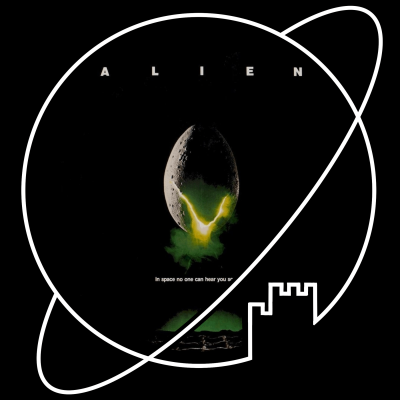

Some media ages a lot better than others.
Generally speaking, visual media, like video games or movies, get the short end of the stick, as new technology surpasses old technique, and practical effects but especially CGI end up looking outdated. Speculative fiction tends to suffer even more, as made up elements need to be brought to the screen by exactly those techniques that are prone to aging.
Then, some media seems miraculously excepted from that rule.
Alien is another one of those films where it sometimes feels like the most outdated element on screen is Sigourney Weaver’s haircut. The effects stand the test of time incredibly well, despite being over four decades (!) old at this point.
I find it especially interesting to compare Alien to other classic science fiction films. For example, Alien was released in between A New Hope and The Empire Strikes Back, and though Alien is of course a lot more modest in scope than Star Wars, I think the difference is striking. Of course, you can still watch Star Wars and I am not saying those are bad movies; but as a viewer I feel like I am constantly reminded of how different those Star Wars-movies would look if they were made today. A movie like Total Recall, which premiered in 1990, eleven years after Alien, and was one of the most expensive productions ever at that time, looks laughably bad when compared to it.
The decisions to keep the film almost entirely confined to the limited crew rooms and cramped and steam-obscured service passages of the Nostromo, and to keep the antagonist hidden for the better part of the script, help immensely in both maintaining suspension of disbelief after forty years, as well as ratcheting up the claustrophobic horror as the crew transition from hunters to hunted. In fact, most of the moments where you can immediately tell you are not watching a movie that came out yesterday are the shots outside of the space ship, or where the titular alien is in plain view.
So the film doesn’t look its age. But is it any good?
Definitely! As I said, the tension in this movie runs really high, also because filmmakers of the past were happy for a slower development than today’s audience is used to. Despite the pace, it has your hart beating and adrenaline pumping all the time. The cast is great, the visual style is great, sound design is great, the script is great. As a horror movie, it has some of the same tropes all horror movies fall victim too, though this movie does have some plot explanations for less-than-optimal decision making. Overall, I would recommend Alien to basically anyone that can stand a horror movie.
There is a lot more to say about Alien– its gender-neutral casting, its completely outdated future technology that sparked cassette futurism, why did Ripley need to take her clothes off, the fact that Alien (at least partially) spawned out of the wreckage of Alejandro Jodorowsky’s failed attempt at a Dune-adaptation – but you don’t need all that for a review. If you haven’t seen it yet, go watch Alien – it’s rightfully a classic of the genre.

The first time I saw this movie was with my father. He was a huge fan of the alien franchise, especially of the first two movies, and it would not surprise me if he has had a Ripley-poster above his bed when he was young. I loved the thrill of this horror movie with its heartbeat-score and flickering, disorienting lights, crawling under a blanket and against the safe body of my father.
When I watched this movie recently, I was afraid my nostalgic memory of it would fade and make way for a sober view of a decent, but dated movie. But I was wrong! It held up way better than expected! It was slow-paced, as many films of more than 40 years old feel, but it suited the film. From the first scene on the tension established, the camera slowly panning around while the music made unmistakably clear something ominous would happen. Yet, technically nothing problematic happens for the first hour or so. We get the time to get to know the characters with no one clearly being the main character. And even when they meet the alien, they still have not passed the point of no return. And then, finally, shit goes down.
Just a side note to end this review: it is always fun to see how old movies imagine future technology. As for Alien, it apparently could imagine humanity flying huge distances in space with massive mining ships, but we would still have tiny computer screens with MS-DOS interface and terrible quality video and sound transmissions. And an incredible amount of steam!
Tagged:
- Board game designed by Jacob Fryxelius
- Artwork by Isaac Fryxelius
- Published by FryxGames
- Released in 2016
- 1-5 players
- Playing time: 120 minutes
In the 2400s, mankind begins to terraform the planet Mars. Giant corporations try to profit by having the largest share in its development. The temperature and the oxygen level are raised, and the ocean coverage is upped until the environment is habitable. In this 2-3 hour strategic board game, players play as one of the corporations and get victory points for their contribution to the terraforming and for advancing human infrastructure throughout the solar system.
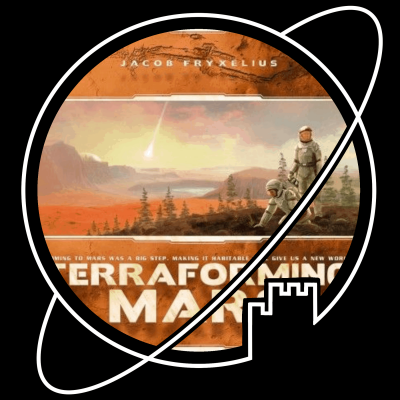

This has been my favourite game for the last two years. The first time I played it, I wasn’t too impressed. Good game, but nothing extra special. Then I got it for my birthday, played it and kept playing it.
Generally, I love the more complex strategic board games and I prefer playing with 3-5 players. Games like Gaia Project are amazing, because every part of the game has influence on another part. You need to plan for the long term, be flexible on the short term, and fail anyhow, while you never have enough of any of the resources. However, in reality I mostly play games together with my wife. She also loves board games, but generally not too complex or too long. She likes the more abstract two player games, but I often don’t feel like those 1-on-1 brain crunchers. I would rather develop my empire and collect points eurogame style. Enter Terraforming Mars, a game we both endlessly enjoy. Why? I think because it combines long-term strategy, short-term opportunism and building up your own empire.
Every round, every player gets their income consisting of money and resources. The height of the income is determined by the production values on the individual player mats, which can be developed during the game. Players get four cards that they can choose to buy or discard, and then starts the main action phase of each round. Here, players can do a couple of different actions, but mainly play cards to increase their production, get victory points or place new forests, cities or factories on the board. As the game progresses, players get more powerful and generally focus their efforts on one of the many ways to score victory points.
What I also love about this game is its attention to thematic detail. Designer Jacob Fryxelius has a PhD in chemistry and has tried to make the game as realistic as possible. The parameters that determine the end of the game actually are the scientific parameters for a habitable planet. The map of Mars with its volcanoes and craters where oceans could exist are geographically correct. The cards all represent technology that could exist and actually more or less cause the effects the cards do, accompanied by some nice flavour texts.
Finally, I want to compliment the design of the pictograms that make the game almost language independent. The only problems are that I do not have enough space when production is high (you can’t go further than 19 on the player mats) and that the term ‘resource’ is used for every kind of thing you can collect, whether it is an animal or an electricity token. Every resource is represented by a cube, I think to allow the cards to span a broad thematic range. It is very efficient game design, but a little confusing for new players.
In short: awesome game, always playing this when I have the chance.
Some elaboration on the expansions Prelude, Colonies and Hellas & Elysium
I like to play with the expansion Prelude, which gives you a little boost at the start of the game. It speeds up the slow start when players do not yet have much of a production going and gives some direction for your long-term strategy. For example, you get a +1 production of titanium, so that (1) you already have some extra income and (2) you will focus on cards that can be bought with titanium. The Prelude-cards do cause some unbalance in the starting position of players now and then, but not so much that I mind. This expansion also includes some new cards for in your standard deck.
Sometimes I combine Prelude with the expansion Colonies. Colonies gives a couple of external places to gain resources for the player who ‘flies over’ there. It is nice to change up the play, but the general opinion of the people I have played this with is: ‘It does not bother me‘. Make of that what you wish. This expansion also includes new cards that often have something to do with the colonies and two new corporations.
I do really like the expansion Hellas & Elysium, which gives you two new maps to play on from other sides of Mars, accompanied by their own milestones (first player to get this gets points) and awards (player who has most of this at the end of the game gets points). These maps have really helped to keep our experience fresh.
Not really an expansion, but worth a mention is the draft-variant. I like to do it at the start when you get 10 random cards to choose your starting hand. When you draft you pick one and slide the rest to the player to your right. You get a new hand of 9 from the player to your left, pick one, and give 8 to the next player. So you continue until all cards are dealt. This balances each players hand.
You can also do this every round when cards are dealt, but that is too much for me. It slows the game down considerably and pushes you to play ‘negatively’: you choose cards to prevent another player from having them instead of cards you want yourself. That defeats the charm of the game a bit for me.

I’m a board game fan, but when it comes down to it, I play surprisingly few board games – most of my time is eaten up by other hobbies. Whenever I do play, however, there is probably an upwards of 80% chance Key is also at the table.
As such it is no surprise that I have played his favourite game, Terraforming Mars, quite a few times by now.
Admittedly, as a player of wargames and table top roleplaying games I am so used to rulebooks over an inch thick that I am probably not the best person to evaluate whether a board game is complex and whether it is easy to get into. But I think Terraforming Mars has found a great balance between complexity and replayability on the one hand, and storytelling and theme on the other.
I think it would take most people at least one game to get used to the mechanics, but even if your chances of winning are probably going to be poor, the game will still be fun: the ‘base building’ aspect of it is very satisfying. The theme really helps here as well – it is just a lot of fun to imagine smashing asteroids into the surface, and to see the terraforming project grow from some microbes on the ice to – eventually – the first zoo on Mars.
By the second game, I think most people will get the hang of it, trying to find synergies between their cards, building up resources and claiming surface area rapidly. From there, not even the sky is the limit. Because of the game’s tall stack of cards drawn at random, which determine the projects/inventions you get to build, no two games play the same. Yes, this random element can screw you some times, but generally speaking, enough cards pass through your hand to mitigate that chance.
This is even more so when including a couple of the expansion sets, which help the game get off to a more rapid start and give you direction right from the get go – addressing probably the most important issues to repeat players.
Finally, I love the ‘hard’ sci-fi aspects of the game. Isaac Fryxelius has clearly given some thought to the actual mechanics of terraforming a planet (and had a close look at Kim Stanley Robinson’s homework on Red Mars). As a result, it even feels like playing the game gives some insight into what such a huge undertaking as a terraforming project could look like – science fiction at its best!
Tagged:
- Card game designed by Thomas Sing
- Artwork by Marco Armbruster
- Published by KOSMOS
- Released in 2019
- 2-5 players
- Playing time: 20 minutes
In this co-operative trick-taking game players set out as astronauts on a space adventure looking for a ninth planet. The journey extends over 50 missions, a kind of levels, getting increasingly harder to complete. Communication in space is not easy, so everybody has to work together closely to not be sucked into the void of space.
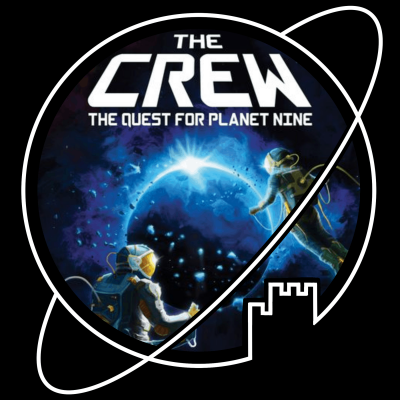

What a fun little game. It offers a fresh twist on the popular genre of cooperative trick-taking games of recent years like Hanabi or The Game. The goal of most missions (levels) is for one or more players to get one or more tricks with a specific card in it. However, the twist in these type of games is always in the manner of communication. This time, the only way to communicate your cards is by placing a card in front of you and placing a communication marker at one of three positions on it, meaning either this is your highest card of this color, your lowest card or your only card.
I have already started four crews and keep having fun with this game. Keeping score is easy, simply the amount of tries to complete a mission, but this game is not about the score. It is about trying to work together, cursing on the cards, cheering when a risk pays off and crying when every player seems hopelessly incapable. Never me, of course.
See also:
Tagged:
- Video game developed by 2K Games
- Directed by Ken Levine
- Released in 2007
- Platforms: Microsoft Windows, Xbox 360, Xbox One, PlayStation 3, PlayStation 4, Mac OS X, iOS, Nintendo Switch
Rapture was a place unlike any other. Away from prying eyes, deep on the ocean floor, business magnate Andrew Ryan built his ideal city. He picked artists, scientists and industrialists to help him build the society of his dreams, where no man was limited by “parasitic” government. However, the city soon crumbled as unregulated “genetic enhancements” known as plasmids drove inhabitants of the city to madness. Now it is 1960, and one could only wish that Rapture were deserted. Instead, giant guardians roam its halls, trailed by little girls who loot corpses. The former fortune seekers scavenge the halls, killing to survive. Through audio logs, the story slowly unfolds as you fight your way through the desolate underwater city.

Bioshock is one of the first “real” video games I played. Like, I’d played some strategy games as a kid, and I’ve played some verrry old First Person shooters as a baby, basically – but I’d never properly played a shooter from start to end until I played Bioshock. To be honest, the genre had never really interested me. I don’t generally like military stuff, and I usually prefer using magic or a bow and arrow over using a gun. I’m not sure how I came to even play this game, to be honest. If I recall correctly, Matt sold me his X-Box 360 and this is one of the games that came with it.
Bioshock is one of my absolute favourite pieces of media of all time. I actually bought the complete collection on the Switch despite already owning it on several platforms. I did a course on political expression in video games in college, and I presented about Bioshock. I even own the tie-in novel, which I found at the thrift store, lol. I’ve even cosplayed Elizabeth from Bioshock: Infinite.
What sets Bioshock apart for me, is the setting. I love old stuff. Walking into Rapture for the first time was… terrifying, but unlike anything I’d ever seen before. Even that doesn’t quite cover it, though. I’m not usually a big fan of horror. Bioshock is definitely scary, and the splicers are basically fast zombies (my absolute nightmare), but it doesn’t feel gratuitous.
I’m not the best at following a story like Bioshock’s. The main story takes place in a series of audio logs, and while they give a good idea of the “vibe” of Rapture during its hay-day, I find it hard to fully understand what actually happened in the City. The tie-in novel really helped with that, though. Not that you need to read the book to understand the video game. I wouldn’t have gone out of my way to buy the book if I hadn’t stumbled upon it in the least likely place ever.
Other things that I love about Bioshock are the sound design and the atmosphere in general. If you love vintage stuff, desolate places and old-timey music, I’d definitely check this game out. If you’re not scared of horror, that is.

Here I am, rating BioShock three and a half stars – while my curator page says it’s one of my favourite franchises, ever. Allright then – what’s going on?
I really love Bioshock. I remember when I read the first preview for the game in an honest to god paper magazine, with these beautiful atmospheric screenshots and a really exciting promise of a mysterious dieselpunk world full of story and invention. When I finally got to play the game (well after its release, because back then I was a kid and did not have the money to fork over full retail price for new games (remember, even then all my spending money went into buying GW plastic crack)), it blew me away. There was so much to love, from the story and the characters to the beautiful world and the exciting mix of magic and gunplay. An absolute 5-star experience.
So why only a 3,5 star rating? Not bad, but maybe a bit meagre for a game so near to my heart, right?
The honest answer is, it’s nearly fifteen years old. Were I transported back to 2007 and writing this review, I would be stuffing BioShock down your throat will all the strength of my 13-year-old muscles. But in 2020s, I feel the game is starting to show its age. Yes, there has been a remaster, but it could not erase all the game’s problems.
BioShock solves the problem of limited computing power that many shooters had those days by being set in a really cramped world of small, dark corridors with very few open spaces. It’s part of the premise, but it affects the gameplay as well. I found that a large part of the game is running down corridors in which you can hardly see anything. The darkness, the tight spaces and the relatively mediocre textures can be a bit disorienting at times, making it much harder to play for the modern player than, for example, a game from about the same time like Borderlands, set in an open world. BioShock‘s great innovation – being a shooter and an RPG at the same time – is now more or less standard, and measured against today’s yardstick your option are annoyingly (and really unnecessarily) restricted. The environmental storytelling feels a bit clunky because there are very few objects. Enemy character models are relatively samey. Etc. I still really love the game, and I think there are certainly people for whom it is worth picking up, but I would think twice before recommending it to anyone thinking of picking up the series now.
Having said that, it hurts to come to that conclusion – because even now some elements hold up so well. The setting, the story, the weird societal critique, the plottwists, the horror-elements… If you can look past its age, those elements of BioShock are certain to blow you away as much now as they knocked my socks off in 2007.
You can read more about my doubts and Lotte’s love for the game in our collection post.
Tagged:
- TV show created by Jim Mickle for Netflix
- Based on Sweet Tooth by Jeff Lemire
- Starring Nonso Anozie, Christian Convery, Adeel Akhtar, Stefania LaVie Owen, Dania Ramirez, Aliza Vellani, James Brolin, Will Forte
- First Aired on June 4th 2021
- 3 seasons
Ten years ago, a deadly virus spread through the world while pregnant women suddenly gave birth to hybrid babies, part human, part animal. As both mysterious occurrences could not be explained and led to discord, the modern society collapsed.
Gus is one of the first of these hybrids, who, because of his sheltered life, is blissfully unaware of the brokenness of the world. As he departs his childhood home to find his mother, he recruits the help of the grim Big Man to get to Colorado.
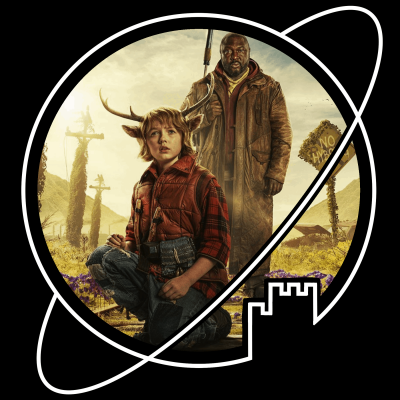

(This review relates to S1)
This post-apocalyptic fairy tale has excellent actors and beautiful cinematography. Found family and hope are the main themes of this story, along with morality and ethical conflicts. Even though the world in which the story takes place is very dark, the narrative finds a way to remain light. I found it very refreshing that all the main characters tried to do good to to the best of their abilities. Would recommend as a family binge-watch, however season one does end on a cliff-hanger. Fortunately, season two is in the making.

(This review relates to all three seasons)
Jasmijn and I binged the first season in the first few days after it was released, and, even though I already expected I would like it, still I was pleasantly surprised by the overall quality.
Despite several child protagonists (all excellent actors, by the way) and a mostly lighthearted tone, Sweet Tooth handles some fairly dark themes one might expect from a post-apocalyptic setting. People die in gruesome (though offscreen) ways and unethical medical practices are at the core of this series’ plot. The writing maintains a precarious balance between these intriguing dark storylines and a story that is also aimed at a younger public. I thought this was masterfully done.
Some other thing I quite liked was the central theme of (found) family. All the main characters provide a different perspective on these concepts. A welcome change from most other post-apocalyptic settings, was the fact that most main characters were good-hearted and likeable.
As for the cinematography, the series delivers some stunning views. Also, most of the special effects, including the hybrid costumes, were convincing.
I would say this is a perfect series to watch as a family, because both younger and older generations will probably find something to their liking. In addition, those who want to carefully try their hands at a post-apocalyptic story might find Sweet Tooth an easily accessible medium to start.
(Addendum for season 2 & 3): After recently finishing the final season, I can honestly say that the quality of this series stays consistent to my initial review and even earned half a star on top of it. Though the later seasons were both darker than the first (with the final season as the darkest of them all), the balance between gruesomeness and lightheartedness remains impressive. In fact, I can now confidently say it is one of the shows strongest aspects. The exploration of grey morality is nothing new in post-apocalyptic stories, but Sweet Tooth‘s take on it hits surprisingly hard. I suspect this might be because the contrast between dark and light moments is stronger than most other stories in similar settings. As a result, a dark twist hits harder than if everything would have been a constant murky grey. Gus, Big Man, Bear (I really love her actress, Stefania LaVie Owen, by the way) and Doctor Singh are the perfect protaganists to explore this duality.

(This review relates to S1)
I quite enjoyed Sweet Tooth. It is a show that somehow feels very familiar. Based as it is on a comic book series, the premise of the story is rather fantastical. Apart from that premise, there isn’t much in this story that surprised me. However, I don’t think a story needs lots of twists and turns to be good. Rather, I’d say that the best stories don’t depend on shock value to do their work for them.
Sweet Tooth, in many ways, feels like a story I’ve heard before. A boy goes on an adventure, and he meets good guys and bad guys along the way. The stakes are high, but mostly in a personal way. The world as a whole has already ended, but Gus’s world is still very much alive. While the show has several protagonists, it is Gus’s story that is the focus. With good reason: a big part of the appeal of the show is Christian Convery’s charming acting. I don’t really like kids, but he’s pretty cute.
While I did enjoy the show, I felt it perhaps might have landed a little better before we ended up in an actual global pandemic. I may be alone in this (though I doubt it, to be honest) but I’m sick and tired of post-apocalyptic stories. Still, I’d say that Sweet Tooth certainly isn’t a pessimistic story. It felt very comfortable to watch, if that makes sense.
See also:
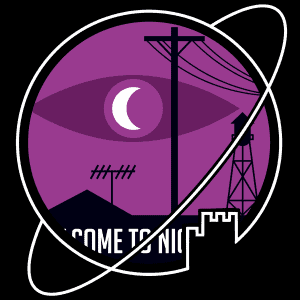
Review: Welcome to Night Vale – Night Vale Presents
Twice-monthly radio host Cecil gives community updates for the small desert town of Night Vale, the place ‘where every conspiracy theory is true’.
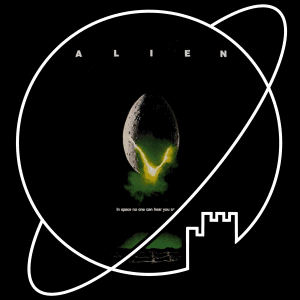
Review: Alien – Ridley Scott
Halfway their trip back home, the crew of the commercial space tug Nostromo is woken from their cryosleep by a mysterious transmission from a nearby meteorite. They decide to check it out.
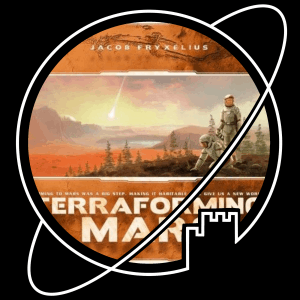
Review: Terraforming Mars – FryxGames
In this 2-3 hour strategic board game, players get victory points for their contribution to the terraforming of Mars and for advancing human infrastructure throughout the solar system.
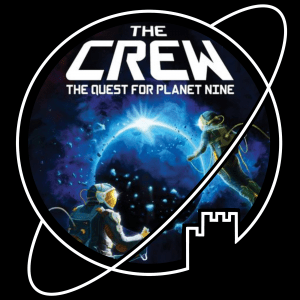
Review: The Crew: The Quest for Planet Nine – KOSMOS
In this co-operative trick-taking game players set out as astronauts on a space adventure looking for a ninth planet.
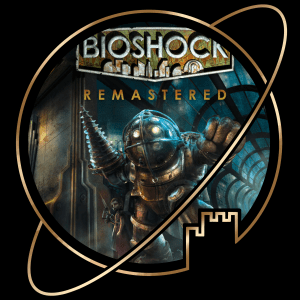
Review: Bioshock – 2K Games
Review: The once magnificent Underwater City of Rapture is deserted, and as you make your way through its dangerous corridors, you slowly discover what happened to what was once Andrew Ryan’s Utopia.
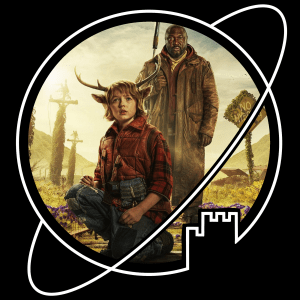
Review: Sweet Tooth – Netflix
Ten years ago, a deadly virus spread through the world while pregnant women suddenly gave birth to hybrid babies, part human, part animal. Gus is one of the first of these hybrids, who, because of his sheltered life, is blissfully unaware of the brokenness of the world.









